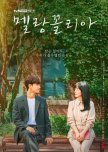A beautiful start that fails to deliver.
It’s always interesting for someone who comes from a notionally egalitarian society (no society actually IS egalitarian!) to watch how hierarchy (an overt aspect of Korean society) is undermined in stories such as this one, whilst also being lauded by the very existence of so many chaebol dramas.
The opening of the drama asks the question, can a gifted student from a lower class background trump a hardworking, corruptly privileged student from a high class background, who was born to lead and must therefore learn how to do so and shine as a leading light in the process. The mention of Eton School is not accidental. Meritocracy versus aristocracy. Both systems have their pluses and minuses, but this drama’s sympathies are firmly in the meritocracy camp.
The drama addresses the underlying attitudes that govern education and thereby society. It is reflected in the perception of mathematics as either a humanity at the service of people’s dreams and creative aspirations (aligned with the meritocracy) or as a science, a descriptor of the world that can carry technology forward and be at the service of those that need to preserve power, sustain order and create wealth (aligned with the aristocracy).
These two approaches mirror the attitudes found in the characters. The two leads consider the experience of living a fulfilling and unscripted emotional life—which may be challenging—is more important than achieving goals and upholding societal structures, as it can open doors onto new worlds and ways forward. Whereas, for the characters at the school, education is there to maintain the status quo and prepare children for the life already set out for them by moulding their attitudes and controlling their emotions. Does the world serve a human being, or does a human being serve the world?
Rigid structures provide boundaries for behaviour and many of the characters have clear plans and justifications for their actions. We may or may not agree with their reasons, but they are clear and logical. Whereas the boundaries for behaviour when governed by the murky world of freedom of emotion, are blurred. And the relationship between the two leads lives in a place of ambiguity, where professional boundaries and personal boundaries are often confused and misinterpreted, providing the viewer with plenty to reflect on.
I loved the first 6 Episodes of this show which were set in 2017. They explored ways of viewing the world, both conceptually and politically, and were filled with subtle interactions between the characters. But after the time jump to the present day these things were, in the main, sacrificed for a somewhat predictable and plodding plot. Revenge, justice and retribution took centre stage and the elements that made the drama distinctive and individual were swallowed up in a story with far too many characters complicating the direction of the narrative.
Needless to say, I found it most convincing when the drama emphasised the cost to the characters rather than the machinations of the plot. If it had focused on fewer characters and tried to say less it would have been far more effective.
There was still plenty to praise in some of the performances.
ISJ brought a sweetness and vulnerability to the character of Yoon Soo which was really appealing. And later managed to convey a strength of character with very little fuss, which I found convincing. I was struck by how she inhabited this character, rather than wore it like a coat, which was my impression of her in Search WWW. I did have my doubts about whether she could express emotion well and this drama has dispelled that. However, by the end I was wondering if she might fly in with angel's wings and a halo.
LDH was convincing as a young Seung Yoo. He managed to show the change between the adolescent and adult very clearly, but as an adult failed to impress me as much. I was not quite sure how he had arrived at his new persona.
Wu Da Vi as Sung Ye Rin, the victim of the system, had a beautifully written part that she played well, and I found her story one of the most interesting. Another performance to note was Choi Day Hoon, who gave a sensitive rendering of the financé.
In stark contrast, Jin kyung’s performance as Noh Jung Ah sprang from a world of mega-melodrama, an unnecessary hurricane leaving only devastation in its wake. Some of the responsibility for it must lie with the writer and director who can only have egged her on.
It was difficult for me to rate this drama, as I really loved the beginning but felt lukewarm about the rest of it, so I have compromised with a 7.5.
What my rating means: 7+ A watchable drama, but nothing exceptional. Good enough to qualify for the race, but finished with the pack. The sort of thing that promises more than it delivers.
The opening of the drama asks the question, can a gifted student from a lower class background trump a hardworking, corruptly privileged student from a high class background, who was born to lead and must therefore learn how to do so and shine as a leading light in the process. The mention of Eton School is not accidental. Meritocracy versus aristocracy. Both systems have their pluses and minuses, but this drama’s sympathies are firmly in the meritocracy camp.
The drama addresses the underlying attitudes that govern education and thereby society. It is reflected in the perception of mathematics as either a humanity at the service of people’s dreams and creative aspirations (aligned with the meritocracy) or as a science, a descriptor of the world that can carry technology forward and be at the service of those that need to preserve power, sustain order and create wealth (aligned with the aristocracy).
These two approaches mirror the attitudes found in the characters. The two leads consider the experience of living a fulfilling and unscripted emotional life—which may be challenging—is more important than achieving goals and upholding societal structures, as it can open doors onto new worlds and ways forward. Whereas, for the characters at the school, education is there to maintain the status quo and prepare children for the life already set out for them by moulding their attitudes and controlling their emotions. Does the world serve a human being, or does a human being serve the world?
Rigid structures provide boundaries for behaviour and many of the characters have clear plans and justifications for their actions. We may or may not agree with their reasons, but they are clear and logical. Whereas the boundaries for behaviour when governed by the murky world of freedom of emotion, are blurred. And the relationship between the two leads lives in a place of ambiguity, where professional boundaries and personal boundaries are often confused and misinterpreted, providing the viewer with plenty to reflect on.
I loved the first 6 Episodes of this show which were set in 2017. They explored ways of viewing the world, both conceptually and politically, and were filled with subtle interactions between the characters. But after the time jump to the present day these things were, in the main, sacrificed for a somewhat predictable and plodding plot. Revenge, justice and retribution took centre stage and the elements that made the drama distinctive and individual were swallowed up in a story with far too many characters complicating the direction of the narrative.
Needless to say, I found it most convincing when the drama emphasised the cost to the characters rather than the machinations of the plot. If it had focused on fewer characters and tried to say less it would have been far more effective.
There was still plenty to praise in some of the performances.
ISJ brought a sweetness and vulnerability to the character of Yoon Soo which was really appealing. And later managed to convey a strength of character with very little fuss, which I found convincing. I was struck by how she inhabited this character, rather than wore it like a coat, which was my impression of her in Search WWW. I did have my doubts about whether she could express emotion well and this drama has dispelled that. However, by the end I was wondering if she might fly in with angel's wings and a halo.
LDH was convincing as a young Seung Yoo. He managed to show the change between the adolescent and adult very clearly, but as an adult failed to impress me as much. I was not quite sure how he had arrived at his new persona.
Wu Da Vi as Sung Ye Rin, the victim of the system, had a beautifully written part that she played well, and I found her story one of the most interesting. Another performance to note was Choi Day Hoon, who gave a sensitive rendering of the financé.
In stark contrast, Jin kyung’s performance as Noh Jung Ah sprang from a world of mega-melodrama, an unnecessary hurricane leaving only devastation in its wake. Some of the responsibility for it must lie with the writer and director who can only have egged her on.
It was difficult for me to rate this drama, as I really loved the beginning but felt lukewarm about the rest of it, so I have compromised with a 7.5.
What my rating means: 7+ A watchable drama, but nothing exceptional. Good enough to qualify for the race, but finished with the pack. The sort of thing that promises more than it delivers.
Was this review helpful to you?


 3
3 2
2

















